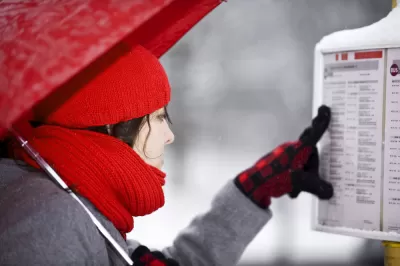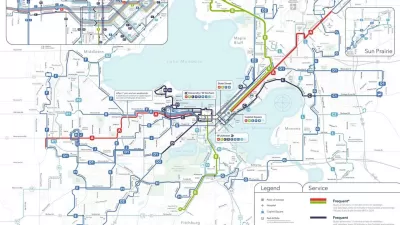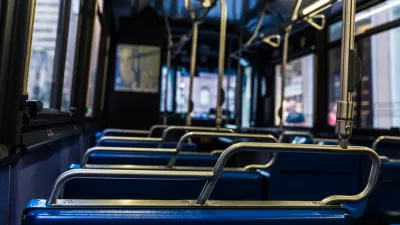Next City introduces the key concepts included in TransitCenter's "Who's on Board" report.

Ken Kinney reports on a new study from TransitCenter, titled "Who's on Board" [pdf]. The report identifies improvements for transit to increase ridership after surveying approximately 3,000 people in Raleigh, Denver, and new York. According to Kinney, "the report makes the expected suggestions for improving transit — increase frequency and speed — but also comes to some conclusions that question transportation industry dogma regarding who rides transit and why."
The dogma Kinney refers to is the distinction between "choice riders" and "captive riders." According to Kinney's explanation of TransitCenter;s position on this distinction, "dividing people this way can be used to justify poor quality transit or flashy upgrades that don’t actually improve reliability, assuming people who have cars must be won over by nice amenities, while people without cars will ride transit no matter what."
Instead of the traditional dichotomy, TransitCenter suggests separating transit riders into three groups: "occasional riders who take transit once in a while, commuters who use transit regularly, but only to get to and from work, and all-purpose riders who take transit to serve a variety of their needs."
The report includes results of the survey on questions about the matters of importance when it comes to transit. At the top of the list: frequency of service. At the bottom of the list: power outlets and WiFi.
FULL STORY: Transit Riders Want Good Service, Not Free WiFi

Planetizen Federal Action Tracker
A weekly monitor of how Trump’s orders and actions are impacting planners and planning in America.

Congressman Proposes Bill to Rename DC Metro “Trump Train”
The Make Autorail Great Again Act would withhold federal funding to the system until the Washington Metropolitan Area Transit Authority (WMATA), rebrands as the Washington Metropolitan Authority for Greater Access (WMAGA).

DARTSpace Platform Streamlines Dallas TOD Application Process
The Dallas transit agency hopes a shorter permitting timeline will boost transit-oriented development around rail stations.

San Francisco's School District Spent $105M To Build Affordable Housing for Teachers — And That's Just the Beginning
SFUSD joins a growing list of school districts using their land holdings to address housing affordability challenges faced by their own employees.

Car-Centric LA Suburb Looks to a Train-Oriented Future
City leaders in Rancho Cucamonga, the future western terminus of the Brightline West rail line to Las Vegas, want to reimagine the city as a transit-oriented, pedestrian-friendly community.

New Alaska Bitcoin Mine Would Burn as Much Energy as the State’s Largest Coal Plant
Fueled by “stranded” natural gas, the startup hopes to become the largest in the US, and to make Alaska an industry center.
Urban Design for Planners 1: Software Tools
This six-course series explores essential urban design concepts using open source software and equips planners with the tools they need to participate fully in the urban design process.
Planning for Universal Design
Learn the tools for implementing Universal Design in planning regulations.
Municipality of Princeton
Roanoke Valley-Alleghany Regional Commission
City of Mt Shasta
City of Camden Redevelopment Agency
City of Astoria
Transportation Research & Education Center (TREC) at Portland State University
US High Speed Rail Association
City of Camden Redevelopment Agency
Municipality of Princeton (NJ)





























